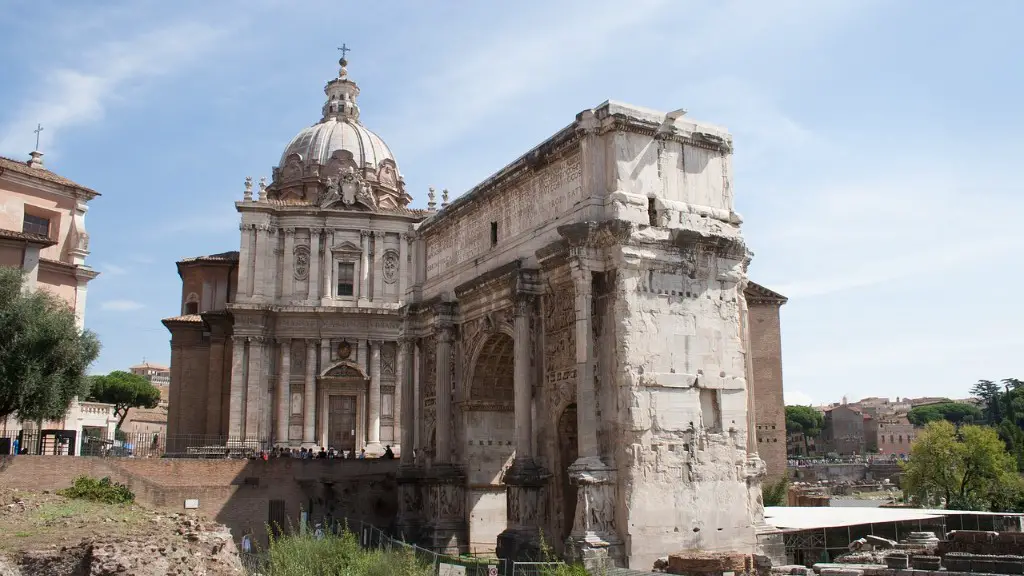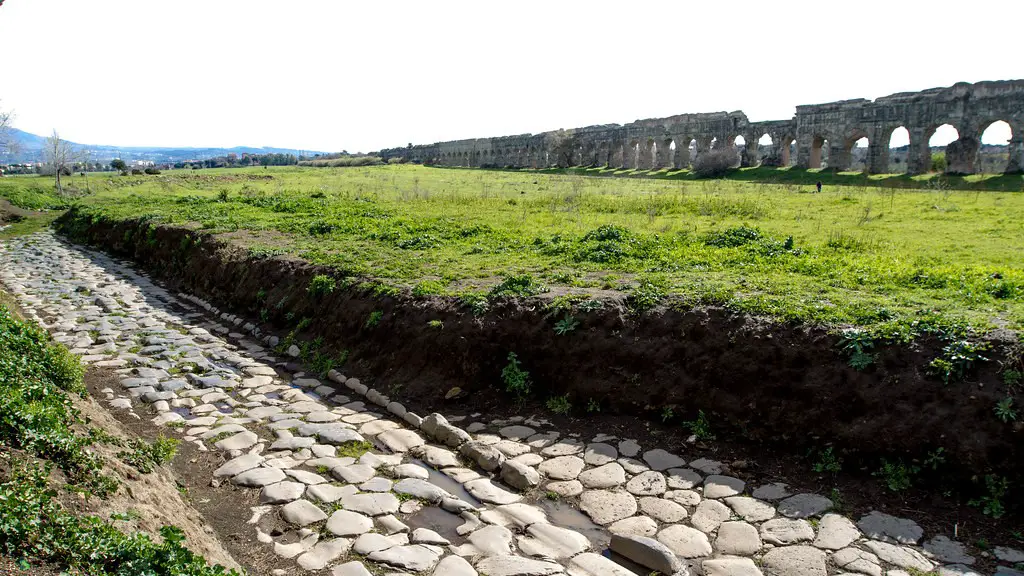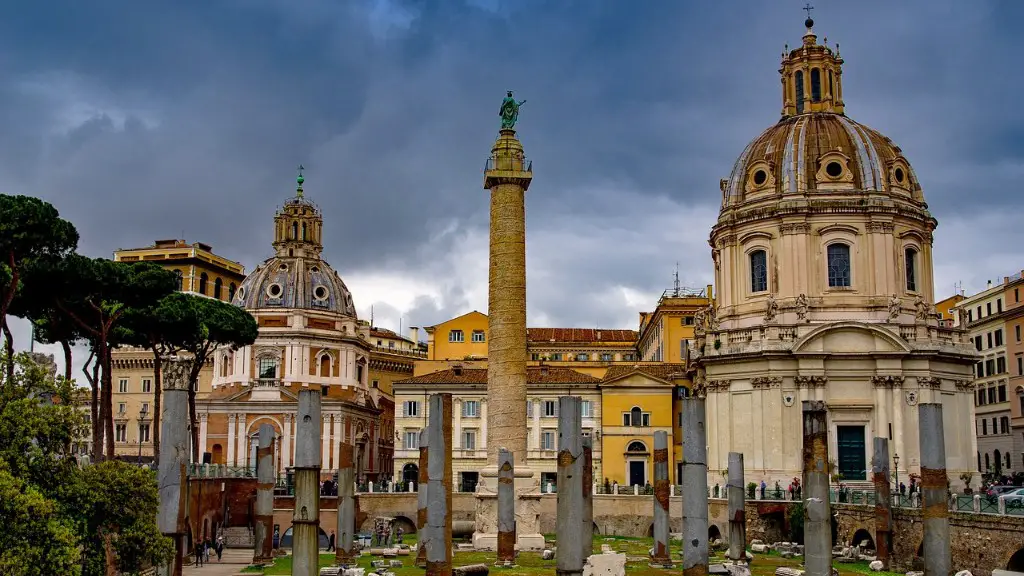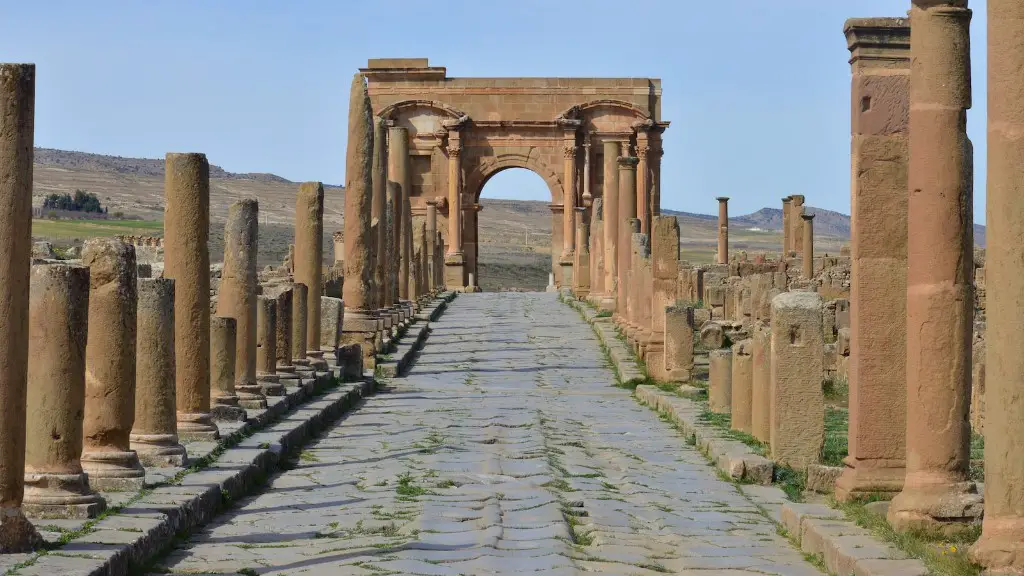Crime rates are higher than ever and while understanding why someone would steal something or resort to violence can be difficult, it is important to consider the consequences of these actions and control the impulse to break the law. The most severe punishment for lawbreakers was a sentence to a prison, and this punishment was even more dreaded in Ancient Rome. In Roman antiquity, a prison sentence in the empire was seen merely as a prelude to execution, and people who committed crimes did not expect to live to see the light of day again.
In Ancient Rome, there were two types of prisons; civile and militare. The civile, or civil prisons, were located in Rome and were supported by the Senate. In these prisons were condemned criminals and common criminals, as well as debtors and people who owed debts. Militare prisons were typically located in military camps and contained enemies of the state and prisoners of war.
In ancient Rome, prisons were typically used as places of safety for criminals, primarily political criminals, who were declared enemies of the state. This was the most common form of incarceration in ancient Rome, especially under the Republic. The man accused of allegations could be held in custody for weeks, months, or even for years until a trial was held. Convicts would then be sent to a prison in a city, where they would be kept until their sentence was pronounced. Once the sentence was pronounced, they would be held in a prison until they met the conditions of their sentence.
Oftentimes, prisoners were sent to the infamous Mamertine Prison, which was located in Rome near the famous Forum Romanum. This place was known to be one of the cruelest and most primitive prisons in the Roman Empire, and it was also one of the most feared. It was an underground cell and prisoners were deprived of food, sunlight, and clean water. The only hope of escape was to have plenty of money, which could be used to bribe the guards.
Another common form of imprisonment in the Roman Empire was exile, which was particularly common during the Principate. Prisoners who were found guilty of violating the lex Julia or lex Cornelia, Roman laws designed to curb corruption, were sent to an island or some other area outside the city of Rome. During the Principate, offenders were banished to provinces in the empire as punishment, usually in Sicily, Sardinia, and Corsica. Roman emperors also set up penal colonies, where offenders were sent and forced to work in mines and quarries to paying for their crimes.
In conclusion, the punishment for criminal activities was severe in the Roman Empire, and prisons were seen as a place of suffering rather than a place of incarceration. Punishments varied from exile to sentences in prisons, and the most severe prison was the Mamertine Prison. However, it is important to note that even though the punishment for criminals was harsh, it did play a role in maintaining order in the Roman Empire.
Conditions in Roman Prisons
Prisons in the Roman Empire were simply decrepit and unpleasant. Most prisons lacked basic amenities such as sanitary facilities, and many prisoners were forced to sleep on the ground with no bedding and no heat. In addition, prisoners were not provided with adequate food or medical attention, even when they were seriously ill. This made prison a truly miserable experience for those who were unfortunate enough to be sent there.
The conditions in the prisons were designed to be as uncomfortable as possible and to make prisoners as miserable as they could be. Prisoners were often chained to the floor or walls and were frequently tortured. This was mostly done to extract confessions from the accused or to extract information from political prisoners. Even the most squeamish Roman citizen could be hardened by the experience, as the terrible conditions served to desensitize even the most moral of individuals.
It is also important to note that the underlying attitude toward prisoners was that of disdain and hostility. The Roman public generally believed that anyone who committed a crime deserved to suffer and suffer greatly. People’s opinions about prisons and prisoners were harsh, which created a negative atmosphere for those serving time.
The biggest irony of Roman imprisonment was that it was typically used as a deterrent to committing crimes. Criminals were often released after serving their sentence, but with the understanding that they did not want to return to the prison. This was the intended goal of the prison system; a way to deter those who may otherwise break the law.
Repercussions of Prison Sentencing under Roman Law
One of the most dreaded punishments of the Roman Empire was a sentence to prison, and this punishment was especially harsh on those who committed politcially-related crimes. Imprisonment was daunting for many different reasons, but the most prominent of these was the severe repercussions that followed a prison sentence. Prisoners were not only subjected to mistreatment, unfair trials, and torture, but they were also blacklisted from society.
It was common for criminals to be punished for their crimes in public, and this public humiliation was often more severe than the actual prison sentence. A criminal’s family and friends were shamed as well, and it was nearly impossible for the prisoner to return to society in the same way as before. Furthermore, a person who had served time in prison was often barred from holding public office or any other position of social influence.
In addition to the public humiliation, prisoners were also robbed of their property and their rights. Under Roman law, prisoners had no rights, and their family was not allowed to access their possessions or properties, which effectively made them destitute. This prevented prisoners from ever returning to a life of financial security after their sentence was up, and it made it difficult for them to start a new life.
The Legacy of Roman Prisons
The legacy of Ancient Roman prisons can still be felt today, as the basic concepts and principles still apply in modern society. In many countries, prisons are still seen as a deterrent to criminal activity, and public humiliation is still used as a form of punishment. The idea of imprisonment as a punishment for criminal activity has been around for centuries and it will most likely continue to be used in the future.
The legacy of the Roman prison system can also be found in the modern penal system. Many of the basic concepts, such as the use of prison as a form of punishment, are still in use today, as they have been practiced in multiple societies throughout history. Additionally, prisoners are still deprived of their rights and freedoms, which is a reflection of the oppressive Roman prison system. The modern penal system may be more humane than its ancient counterpart, but the basic principles remain the same.
It is important to note that despite the harshness of prisons during the Roman Empire, it had a largely positive effect. The fear of the prison system helped to keep the public in line, and it made sure that those who committed crimes were punished. The Roman prison system may not have been perfect, but it was effective and it had a lasting impact on society.
Rebuilding Lives After Prison
One of the biggest challenges that people face after a prison sentence is the challenge of rebuilding their lives and regaining their place in society. This is no easy feat and it requires determination, dedication, and an ability to overcome the stigma that comes with being a former inmate. Many people struggle to find work and reintegrate into society after they have served their sentence, but there are a few steps that can be taken to help.
The first step is to take the time to reflect upon the experience and learn from it. This will help the person to develop a better understanding of the crime, the consequences, and the potential for rehabilitation. It will also give them insight into their own strengths and weaknesses and provide guidance for how to move forward. It is also important to remember that it is possible to rebuild one’s life and to find work, but it necessitates preparation, persistence, and seeking out self-development opportunities.
It is also important to establish positive interpersonal relationships, as this will provide support and guidance for those trying to rebuild their lives. It is essential to cultivate strong relationships with family members, friends, and people in the community who are willing to offer advice and guidance. Additionally, it is important to seek out professional help if necessary, as there are many organizations and counselors that can provide valuable advice and assistance.
Finally, it is important to remember that while rebuilding one’s life can be difficult and time-consuming, it is possible to do so. With the right tools, determination, and hard work, it is possible to start anew and live a productive life. It is also important to remember that a criminal record does not define a person and that everyone is worthy of a second chance.
Modern Techniques for Managing Prisons
The Roman prison system is no longer in use, but the remnants of the system remain. Even though the conditions may have improved, modern prisons still share a common idea with ancient prisons – punishment. This is seen in the way that prisoners are housed, the lack of rights, and the oppressive atmosphere. Nonetheless, there have been some advancements in prison management techniques that have improved the overall prison experience.
One of the most important advances in prison management has been the development of rehabilitative programs. These programs are designed to teach prisoners valuable skills that can be beneficial in the workplace. Additionally, these programs can help prisoners to reintegrate into society after they have served their sentences and to make them employable upon their release. These programs also provide a sense of purpose to inmates and can help them to feel as though they are regaining some sense of control and dignity.
Another important advancement is the recognition that prison should be a form of punishment, but not necessarily a form of torture. This means that inmates should be treated with respect and their basic needs should be met. This includes providing inmates with enough food, access to essential healthcare, and opportunities to exercise. Additionally, prisoners should be given more access to legal rights and be provided with an adequate educational system.
Finally, it is important for prison management techniques to be focused on rehabilitation and recidivism prevention. This means that prisoners should be given the opportunity to develop professional skills, take up vocational courses and receive psychological help. This can help to prepare them for life after prison and to reduce the chances that they will reoffend.
Conclusion
The Roman prison system was a cruel and oppressive system, as inmates often suffered abuse and torture. Even though the conditions have improved, modern prisons still have many similarities to the Ancient Roman system. Nonetheless, there have been some advancements in prison management that have improved the overall prison experience and enabled prisoners to regain some of their freedom. These advancements have created a more humane environment for prisoners, and have allowed for more positive outcomes for those who have been released from prison.





